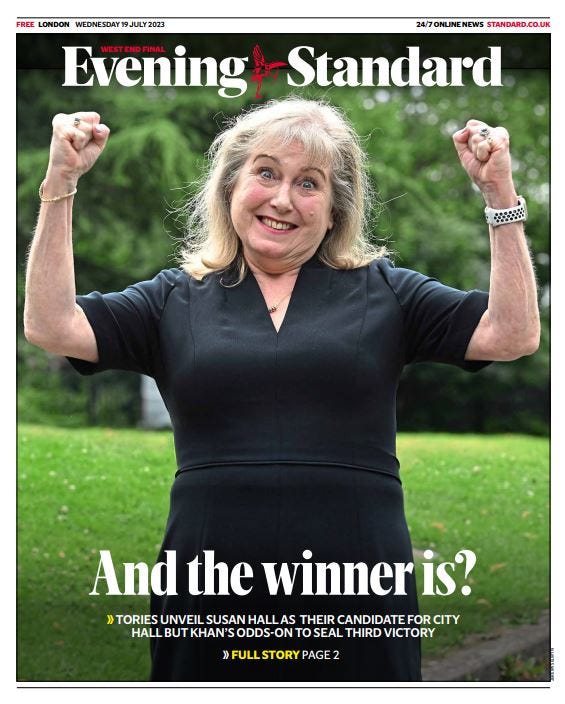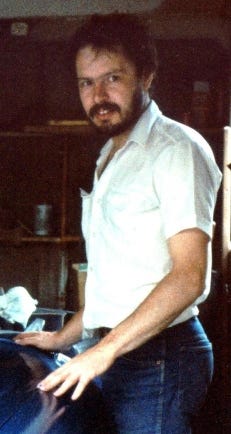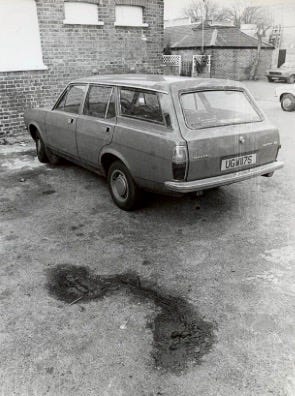How a car park axe murder led to a £2m police payout
The Met has paid damages to the family of murdered private detective Daniel Morgan
Morning — still no sign of answers in one of London’s coldest cases: the murder of private detective Daniel Morgan in 1987. But this week it was revealed the Met Police has paid out a huge sum to Morgan’s family and apologised for “corruption” in its handling of the case. That’s after your Thursday briefing below.
Plus: rampant pint inflation, the Conservatives finally pick their mayoral candidate, and anti-gentrification activists claim victory in Brixton.
Consider supporting us: if you’re enjoying the Spy and want to help us grow, you can pledge your support using the button below. You won’t pay anything yet — but you’ll be first in line for a paid version of the Spy when we launch.
What we’ve spied
🍺 The cost of a pint in London is going up, up and up. And as we learnt this week, a pint here is way more expensive than it is elsewhere in the country. Duh, you might say, but it hasn’t always been this way, as shown by the below chart by an academic on Twitter. Back in 2010 the difference was a matter of pence, not pounds. There’s still one pub in the city where you still can get a pint for £1.71 though (spoiler: it’s a Wetherspoons).
🔵 The Conservatives have officially selected their mayoral candidate: Susan Hall. She beat her only rival, the little-known barrister Mozammel Hossain, by a hefty margin, with 57% of the vote. Her victory was no doubt aided by the fact that third shortlistee Daniel Korski dropped out of the race after being accused of groping (an accusation he denies). Running under the slogan “Safer with Susan” and describing herself as a “Londoner through and through”, Hall says her main priorities are to stop the expansion of ULEZ, improve the Met Police and create more affordable housing. Described as “hard-right” by Labour, she’s previously been criticised for stating that the Black community has a “problem with crime” and complaining that white people shouldn't be accused of being racist for saying so. In a bizarre twist, news of her selection has since been overshadowed by reaction to the Evening Standard’s choice of frontpage photo, which features Hall posing with her hands in the air. It’s a “clear mockery” taken “with malicious intent”, says the Conservative Party’s deputy chairman.
❄️Cocaine use is up by a quarter, according to an analysis of wastewater in London and other major UK cities. The data comes from the National Crime Agency, which says it’s now routinely testing London’s wastewater for drugs. It’s not totally clear what caused the spike, but one theory is that it might be down to prices being lower last year due to a supply glut.
🏢 Plans for a 20-floor office block near Brixton’s Electric Avenue have been withdrawn. The tower, which was proposed by a Texan billionaire DJ called Taylor McWilliams and was seen by some as a symbol of gentrification in the area, had previously been approved by Lambeth council, despite nearly 8,000 people signing a petition against it. Amongst those opposing the scheme was Historic England, the Victorian Society, the Brixton Society, local MP Helen Hayes as well as a dedicated campaign group Save Nour.
📣 Undercover police able to issue £100 fines for cat-calling could be deployed across the capital. The idea follows a pilot scheme in Redbridge where police have been on patrol every night of the week — both uniformed and undercover — to improve women’s safety on the streets. As part of the council’s ThisHasToStop campaign, new signs have been put up around the borough stating that cat-calling is “now an offence”. If or when it’ll be rolled out citywide is currently a bit unclear, but Chief Inspector Louise Jackson said she was in “no doubt” that it would be implemented in all boroughs “at some point”.
🚴♂️ Plans for a ‘bike bus’ in the Silvertown Tunnel have been unveiled. When the Silvertown tunnel is built, cyclists won’t be allowed to use the road, so TfL has come up with the idea of a dedicated bus service for cyclists. An eight-week consultation on the proposals is now underway.
Explained: Why the Met has settled over the Morgan murder
For decades the family of private investigator Daniel Morgan have lacked answers as to why he was found with an axe embedded in his skull in a pub car park in south London in 1987. No one has ever been convicted of his murder, despite six separate investigations in the years since. And while justice looks increasingly unlikely, this week the Met Police issued a formal apology to the family, admitted the case had been “marred by a cycle of corruption” and paid out damages reportedly worth £2m.
It’s one of the biggest payouts in British policing history, though perhaps an unsurprising sum, given the long shadow cast over the murder by corrupt cops. At best, accusations of corruption have been directed at the Met’s dodgy investigations — the force has admitted officers shielded suspects and did not adequately chase down leads. But at worst, some have alleged police officers directly played a role in Morgan’s murder.
Morgan was aged 37 when his body was discovered at 9.40pm in the Golden Lion car park in Sydenham in March 1987. At the time he was working as a detective-for-hire under his company Southern Investigations, along with business partner Jonathan Rees. They operated in the murky world of private investigation, in the orbit of local police officers in south east London. From the start, the initial murder investigation had some questionable aspects — a poor handling of the crime scene for instance, which was left unsearched and unguarded. Another red flag was that the officer assigned to the case, detective sergeant Sid Fillery, had been working unofficially for Southern Investigations, unbeknownst to his superiors at Catford police station. A month after Morgan was killed, DS Fillery, Rees, Rees’s brothers-in-law and two other Met officers were arrested on suspicion of murder. Even that hadn’t gone by the book — they appeared to have been alerted to their arrest a day early by a leak to the media. But all six were eventually released without charge.
Just as the pressure seemed to abate, a bombshell piece of testimony came a year later in 1988 at the inquest into Morgan’s death. An accountant at Southern Investigations, Kevin Lennon, told the inquest he had seen Rees’s relationship with Morgan deteriorate. He alleged that Rees had told him that officers at the local Catford police station, who were friends of Rees, were either going to murder Morgan or would arrange it. And then after the murder, DS Fillery would replace Morgan as Rees’s partner. What made the testimony particularly shocking was that by the time of the inquest, Fillery had indeed retired from the Met police on medical grounds and had joined Southern Investigations as a partner.
Rees and Fillery denied they were involved in the murder. But over the coming years, as more investigations were ordered, carried out incompetently, and then re-ordered, Rees and Fillery remained on the radar. Eventually, in 2008 charges were brought against Rees and Fillery. Rees was charged with the murder of Morgan, while Fillery faced charges of perverting the course of justice. Rees’s brothers-in-law were also charged with murder, plus a builder named James Cook. But after a further few years of legal wrangling and issues with so-called supergrass witnesses, the case collapsed, marking the last time anyone was prosecuted for Morgan’s murder.
This week’s apology from the Met did not touch on the possibility of police involvement in the murder. Instead, it focused on the handling of the subsequent investigations. “I unequivocally and unreservedly apologise for the failure of the Metropolitan Police Service to bring those responsible for the murder of Daniel Morgan to justice,” said commissioner Sir Mark Rowley in a statement issued on Wednesday.
“From the earliest stages, his family have been repeatedly and inexcusably let down by the Metropolitan Police. This case has been marred by a cycle of corruption, professional incompetence, and defensiveness that has repeated itself over and over again. Daniel Morgan’s family were given empty promises and false hope as successive investigations failed and the Metropolitan Police prioritised its reputation at the expense of transparency and effectiveness.”
That final part of Rowley’s statement echoes the findings of the last major enquiry into the Morgan murder. In 2021 an independent panel set up by the home secretary found that the force had repeatedly covered up and denied its failings in the case. In the panel’s view that was a form of “institutional corruption”. It also identified what those failings had let slip through the net: a proper investigation into why exactly Morgan would be murdered in the first place. One such possibility the panel thought was never “seriously investigated” included evidence that Morgan was planning to take a story to the media about police corruption. That may have put a target on the back of Morgan in the eyes of some officers, who were unwilling to give up lucrative practices like selling confidential information or assisting criminals with inside police information. “The nature of that corruption has never been established,” the panel wrote.
Despite the settlement with Morgan’s family, who have long campaigned for justice, the Met has stressed it isn’t closing the Morgan case. A forensic review into several key items first commissioned in 2021 is ongoing, and the force is offering a £50,000 reward for information. Like the £2m payout, it’s another record sum in British policing history.
Further reading:
The book written by Daniel Morgan’s brother Alastair in 2017, as well as the podcast series produced to coincide with its publication
Commissioner Sir Mark Rowley’s full statement from this week
Any of the reporting on the Daniel Morgan murder by crime Substack The Upsetter






It’s striking how little new has surfaced on the Daniel Morgan case for decades. For the first time, there are fresh revelations tying News of the World reporter Stuart Collier directly into events around the murder. Worth reading: https://collierexposed.substack.com/p/exposure-07
I know who did it and why!
The Met,kent,Hampshire and Surrey were all involved! Dog fighting in police kennels with members of publics stolen dogs! If you want to see the evidence,I have it all!